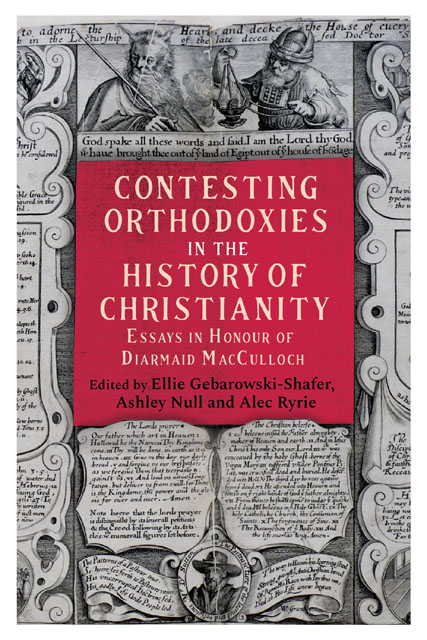Book contents
- Frontmatter
- Contents
- List of Illustrations
- List of Contributors
- List of Abbreviations
- Introduction
- 1 ‘Jewish Christianity’ in Antiquity: Meaningless Category or Heuristic Irritant?
- 2 ‘Sola Fide’: the Wrong Slogan?
- 3 Both Cromwellian and Augustinian: the Influence of Thomas Cromwell on Reform within the Early Modern English Austin Friars
- 4 Lex, Rex and Sex: The Bigamy of Philipp of Hesse and the Lutheran Recourse to Natural Law
- 5 The Authority of Scripture in Reformation Anglicanism: Then and Now
- 6 Orthodoxy and Heresy in the Post-Reformation
- 7 Profanity and Piety in the Church Porch: the Place of Transgression in Early Modern England
- 8 Writing on the Walls: Word and Image in the Post-Reformation English Church
- 9 The Myth of the Church of England
- 10 Mysticism, Orthodoxy and Reformed Identity before the English Revolution: the Case of John Everard
- 11 Sacrilege and the Sacred in England’s Second Reformation, 1640–1660
- 12 ‘I had not the patience to be quiet’: Arthur Bury and The Naked Gospel
- 13 ‘A soul-corrupting indifferentism’: the Intellectual Development of Benjamin Henry Latrobe
- 14 Newman, Dogma and Freedom in the Church
- 15 ‘Tommy, ’ow’s yer soul?’ Reconsidering Religion and the British Soldier
- 16 The King James Vulgate
- 17 The Myth of the Anglican Communion?
- Select bibliography of Diarmaid MacCulloch’s scholarly publications
- Bibliography
- Index
- Tabula Gratulatoria
- Studies in Modern British Religious History
5 - The Authority of Scripture in Reformation Anglicanism: Then and Now
Published online by Cambridge University Press: 09 January 2024
- Frontmatter
- Contents
- List of Illustrations
- List of Contributors
- List of Abbreviations
- Introduction
- 1 ‘Jewish Christianity’ in Antiquity: Meaningless Category or Heuristic Irritant?
- 2 ‘Sola Fide’: the Wrong Slogan?
- 3 Both Cromwellian and Augustinian: the Influence of Thomas Cromwell on Reform within the Early Modern English Austin Friars
- 4 Lex, Rex and Sex: The Bigamy of Philipp of Hesse and the Lutheran Recourse to Natural Law
- 5 The Authority of Scripture in Reformation Anglicanism: Then and Now
- 6 Orthodoxy and Heresy in the Post-Reformation
- 7 Profanity and Piety in the Church Porch: the Place of Transgression in Early Modern England
- 8 Writing on the Walls: Word and Image in the Post-Reformation English Church
- 9 The Myth of the Church of England
- 10 Mysticism, Orthodoxy and Reformed Identity before the English Revolution: the Case of John Everard
- 11 Sacrilege and the Sacred in England’s Second Reformation, 1640–1660
- 12 ‘I had not the patience to be quiet’: Arthur Bury and The Naked Gospel
- 13 ‘A soul-corrupting indifferentism’: the Intellectual Development of Benjamin Henry Latrobe
- 14 Newman, Dogma and Freedom in the Church
- 15 ‘Tommy, ’ow’s yer soul?’ Reconsidering Religion and the British Soldier
- 16 The King James Vulgate
- 17 The Myth of the Anglican Communion?
- Select bibliography of Diarmaid MacCulloch’s scholarly publications
- Bibliography
- Index
- Tabula Gratulatoria
- Studies in Modern British Religious History
Summary
At the heart of the English Reformation was a debate over what defined catholic orthodoxy: scriptural warrant alone or also ancient church praxis? In the 1530s Philipp Melanchthon argued that the Scripture-versus-tradition argument was a false dichotomy, since the fathers defined the church’s consensus fidelium as nothing other than the apostolic witness as found in sola scriptura. At the invitation of Thomas Cromwell, Alexander Alesius, an exiled Scot who had taught both at the University of Wittenberg and at Cambridge, injected this argument into the discussions of the vice-gerential synod of 1537. Since the resultant Bishops’ Book was a compromise which failed to resolve the fundamental issue, the question was taken up again two years later during the debate over the Act of Six Articles. Grounded in a close comparison between the scholarship of Alesius, who by then had become a close friend of Cranmer, and ‘The Writings of Authorities’, a pamphlet incorporated into ‘Cranmer’s Great Commonplaces’, this essay shows how thoroughly Cranmer made the Lutheran approach to defining catholic orthodoxy his own. The essay argues that ‘The Writings of Authorities’ records some of the specific arguments, long thought to have been lost, which Cranmer made against the Act, and traces how these teachings on the Bible, derived as they were from the Lutheran construal of the ancient orthodoxies of Scripture and the Fathers, eventually became the basis for an enduring Anglican orthodoxy through their incorporation into the Edwardian formularies and the Elizabethan Thirty-Nine Articles.
In August 1535, Alexander Alesius (1500–65) left Wittenberg, where he had gone into exile a few years earlier, to return to Great Britain, albeit to England rather than his native Scotland. Formerly an Austin canon of St Andrew’s cathedral priory, Alesius had first made a name for himself by using John Fisher’s Assertionis Lutheranae confutatio to argue persuasively against Luther’s teachings. However, his assignment to persuade Patrick Hamilton to recant his Lutheran beliefs in 1528 had quite the opposite effect. Alesius was the one who privately changed his commitments. Soon after, the archbishop appointed him to address a provincial synod of bishops and clergy. Avoiding controversies in doctrine, he instead criticised the lax moral state of the clergy and, by implication, the well-known improprieties of his own prior, a man who eventually had ten illegitimate children and whose hand had joined those signing Hamilton’s death sentence.
- Type
- Chapter
- Information
- Contesting Orthodoxies in the History of ChristianityEssays in Honour of Diarmaid MacCulloch, pp. 77 - 97Publisher: Boydell & BrewerPrint publication year: 2021



